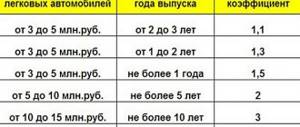Why does this happen and who is to blame
Transport tax is charged to the owner of the car, because sales of vehicles are carried out under standard sales contracts. The tax service will not be able to find out about the change of owner automatically. After all, only Rosreestr carries out registration of contracts for the sale of real estate.
Vehicles do not fall into this category. Therefore, it is possible to delete the name of the previous owner in the database of persons paying transport tax only after deregistering the car. If this does not happen, then the tax will be charged to the person who owns the vehicle.
The reasons for charging tax on a sold car may be:
- collection of fiscal payments for the previous period when the car was owned by the seller;
- sale of a car under a simple power of attorney (a general power of attorney allows the new owner to re-register it in his name);
- the new owner does not want to re-register the vehicle for any reason. For example, immediately after the purchase, an accident occurred, after which the car cannot be restored or there is an unwillingness to pay tax;
- the buyer cannot deregister the car due to illness or errors in the purchase and sale agreement (hereinafter referred to as the SPA);
- the traffic police officer did not transmit information about the change of owner to the tax office;
- the transferred data was lost to the Federal Tax Service due to a technical malfunction of the software or the negligence of the inspector.
Include a security deposit in the sales contract
If you stipulate in the purchase and sale agreement that, in addition to the purchase price, a security deposit has been established to pay fines or taxes that may come to the seller, then you will protect yourself in advance from receiving taxes on a car that was sold long ago.
State that you will return the amount after the buyer presents documents confirming the registration of the car in his name.
If you did not do this, and then received a tax notice for the equipment sold, submit a statement to the Federal Tax Service about inaccurate information regarding the vehicle
Ways to solve the problem
What should I do if I receive tax on a sold car? The algorithm of actions is as follows.
1. You need to figure out for what period the payment was issued. It is quite possible that the tax office legally assessed the tax, i.e. during the time when the car was still with the recipient of the notice. This is checked simply: the total amount of tax charges must be less than the annual amount. In this case you will have to pay.
2. The tax amount is less than the annual tax, but more than the time that the car was with the seller. This means that re-registration was carried out, but several months after the transaction. Again you will have to pay and look for a buyer to return the overpaid amount of tax. In practice, no one searches. More valuable to yourself.
3. The tax is calculated for the entire year, which means that the tax office still lists the seller as the owner of the vehicle. In this case, it is first necessary to establish the reason why the taxpayer database has not been changed. You should start with the Traffic Inspectorate.
There are two ways to check whether a car has been deregistered:
- personally visiting the MREO traffic police department. You must have an identification document and DCP with you;
- remotely using the Traffic Inspectorate website. Here, using the VIN code (must be indicated in the DCP), you can check all the information, but without specific names, about the removal and registration of this vehicle. There are two possible events here:
- the car is deregistered;
- The car is registered with the old owner.
The car is deregistered, the tax has arrived
There are not so few cases when the car is listed as the buyer’s in the MREO, but the tax is charged to the former owner. Here, either the information was not received by the Federal Tax Service, or problems arose in the software. There is no need to run anywhere right away. First you need to find out who is listed as the owner of the car in the taxpayer database.
This can be done by calling the 24-hour Federal Tax Service hotline at tel. 8-800-222-22-22. After clarifying the identity of the caller, the call center operator will answer all questions. If there is a failure in the system (the owner of the vehicle is different), he will either cancel the sent notification or instruct him on how to do it quickly and correctly.
The second opportunity to check who owns the sold car at the tax office is to go to the portal www.nalog.ru and through your Personal Account (if you don’t have one, you will still have to go to the tax office) view the entire list of movable and immovable property on which taxes are calculated .
If there is no car in the taxable objects, you need to call the executor, the inspector who issued the tax, at the telephone number indicated on the notification and close the problem. It's rare, but a phone call doesn't help. In this case, you must visit the tax office in person with the written notice and identification card. In order not to sit in line there, you can pre-order a coupon number for a specific time on the State Services portal.
It’s a little more complicated if the car is deregistered, which is information on the State Traffic Inspectorate’s website, but is listed as the seller’s by the Federal Tax Service. Here, first, the traffic police MREO is visited, where a certificate of deregistration of the car is obtained. Then a trip to the tax office. You need to have with you:
- a certificate from the MREO about deregistration of the car;
- application/notification to the Federal Tax Service about deregistration of the vehicle.
Apart from the specified documents, you do not need to submit anything else (almost all materials on this topic include the DCP and passport). The application is written in any form: To the Head of the Federal Tax Service No., from Last name, First name, Patronymic name, INN, registration address, after which the essence of the issue is stated, which indicates that the car will be deregistered from such and such a date, in connection with which I ask for a recalculation tax The paper ends with a date and signature.
The inspector accepts the documents, registers the application and transfers it directly to the contractor, if he is not one himself.
The car is not deregistered
If the new owner has not re-registered the car, everything is much more complicated. Firstly, there are only 30 days to solve the problem. If during this time the buyer does not agree to reimburse the costs of paying the tax, he will have to pay it out of his own pocket.
But in any case, you will have to pay according to the issued notice - you may face fines and an appeal by the Federal Tax Service to the bailiff service with all the ensuing consequences. In principle, there can be no redirection of the accrued tax to another tax office to the new owner, as is written about on many websites.
Let's explain. The tax office can make changes to the taxpayer database only from the moment the car is deregistered. For them, a vehicle purchase and sale agreement is not a fundamental document on the basis of which any manipulations with taxable objects can and should be carried out. This document is official information from the State Traffic Inspectorate. But no one at the MREO will retroactively deregister the car. The circle is closed.
Secondly, you urgently need to deregister the car. We'll talk about this in more detail below.
What to do if you are charged transport tax on a sold car
The situation when the former owner receives a notice to pay transport tax on a sold car is not a rare occurrence. The reason for this most often is that the buyer does not register the vehicle in a timely manner. What to do if you are charged transport tax on a sold car, Karelian tax officials told.
Payers of transport tax are citizens on whom vehicles recognized as an object of taxation are registered. That is, the obligation to pay transport tax depends on the state registration of the car, and not on its actual availability or use.
The basis for assessing the tax is information received by the inspectorate from local bodies of the State Road Safety Inspectorate. Transport tax on a sold vehicle is not paid if it is deregistered. There are no other grounds for terminating the obligation to pay transport tax (except for theft).
Moreover, if the car is sold during 2021, the previous owner must pay tax in proportion to the number of full months during which the car was registered to him, taking into account the coefficient determined as the ratio of the number of full months during which the vehicle was registered to him , to the number of calendar months in the tax period.
For example, a car was sold on May 1, 2021, and deregistered with the State Road Safety Inspectorate after October 15, 2021. In this case, the seller (former owner) will be charged tax for 10 months and the notification will indicate the number of months of ownership as a fraction: 10/12. The moment of transfer of ownership of the car on the basis of a purchase and sale agreement does not play a role here.
If incorrect information is found in a tax notice, the taxpayer should not ignore this fact. The previous owner has the opportunity to stop registering the car in his name by contacting the State Road Safety Inspectorate.
Other inaccuracies specified in the notification can be reflected in the application by sending it in electronic form through the official website of the Federal Tax Service of Russia (www.nalog.ru) using the services “Taxpayer Personal Account for Individuals”, “Contact the Federal Tax Service of Russia” or on paper carrier by mail (in person).
When visiting the inspectorate in person, we suggest using the “Online registration for an appointment with the inspection” service to plan your visit to the tax authority in advance and minimize the waiting time in line.
The inspectorate, if necessary, will send a request to the State Road Safety Inspectorate, recalculate the transport tax if there are grounds, and send a new tax notice to the taxpayer. If the State Road Safety Inspectorate does not confirm the information provided by the taxpayer, the tax inspectorate will send an information letter to the taxpayer, informing him of the results of the review.
It should be remembered that the deadline for paying transport tax for 2017 is no later than December 3, 2021.
How to be
After notification of the need to pay tax, the situation can develop in different ways:
- the tax was paid for the year, but the car was deregistered in the middle of the year;
- the car was not deregistered, I had to pay;
- the tax has not been paid.
With tax paid
When paying tax on a deregistered car, an application is written to the tax office for recalculation or refund of previously paid tax. A certificate from the traffic police is attached to the application. If you have paid tax on a car that is registered with the old owner, you can use several ways to return the amounts paid:
- find a buyer and show him tax receipts to compensate for losses in the family budget;
- go to court to recover the amount of tax paid from the new owner. But, to be honest, it is long, difficult and dreary;
- terminate registration: due to sale; due to loss.
This is the most stringent option, leading to the fact that the buyer himself will find the seller, reimburse taxes, and also pay decent money for finding the car in the impound lot. Agree, insolent people are punished.
With unpaid
When the tax comes on a car that you sold a long time ago, the solution to the problem depends on whether the car was deregistered or not. If re-registration is carried out, then after receiving a certificate from the MREO, the problem is resolved at the tax office at the place of residence.
If the buyer has not re-registered the car in his name, then he must contact him within 30 days from the date of the decision to pay the tax and offer to pay the tax for himself. If he refuses or it was not possible to find him, the tax must be paid. For what to do next, see the previous section.
What if the PrEP is not preserved?
The situation when the vehicle purchase and sale agreement has not been preserved is provided for in the order of the Ministry of Internal Affairs No. 605 dated 08/07/2013. In accordance with it, it is necessary to contact the State Traffic Inspectorate with a request to cancel the account due to the loss of the car. You only need to have a general passport with you that confirms your identity. There is no need to present your car for inspection. Withdrawal is free of charge.
In such a situation, a new owner will be found very quickly, because... They won’t let him drive anymore (a search has been announced for her), but he can register the car again, but with the involvement of the old owner. Here you will not only have to return the taxes paid, but also pay the former owner for the “concern.”
Is it possible to independently deregister a car after sale?
The former owner of a car has the opportunity to deregister it after selling it independently: by visiting the traffic police MREO in person or remotely via the Internet.
Personal visit
When visiting the MREO in person, you must have the vehicle registration certificate and a completed application form for deregistration of the vehicle. The application has a sample of the established form, which can be taken directly from the traffic police or downloaded here.
In the application, first fill out the “header” and then the section: “To terminate the registration of the vehicle due to the sale (transfer) to another person.” Next, the data on the car and the main details of the purchase and sale agreement are indicated: where, when and to whom the car was sold.
After receiving a certificate from the State Traffic Inspectorate about the removal of the car, it is the turn of the Federal Tax Service. How his visit goes was discussed above. The fate of a deregistered vehicle is as follows: it is put on the wanted list, detained and placed in an impound lot until the new owner registers the car in his name.
Through the Internet
Currently, the procedure for deregistering a car is available via the Internet, which is much faster and easier. The procedure is as follows:
- go to the State Services website (you must register with the received login and password);
- find the “Transport and Driving” page;
- On the page that opens, click on the section: “Vehicle registration”;
- activate the position: “Deregistration”;
- in the newly opened tab, select the lowest position;
- After the information section appears on the monitor screen, the “Get service” window is activated.
The form that appears is filled out and then sent to the address of the MREO where the car was registered. After a call from a State Traffic Inspectorate employee or an email, you need to trace the fate of the car in the tax office database. To do this, it is best to personally visit first the traffic police, and then the tax and duties inspectorate.
Many problems can be avoided if the car is sold correctly: first, the car is deregistered and driven with transit license plates, and then goes on sale.
When do fines and taxes arrive on a sold car?
What to do if the car buyer does not register the car after 10 days? First of all, pay all taxes and fines that came to the name of the owner, otherwise a penalty will be charged and available compulsory collection measures will be used. What additional actions should be taken:
- Find the person who purchased the vehicle and demand that it be registered in the prescribed manner.
- Contact the MREO with an application to deregister the car. The procedure and rules will be explained by a specialist on site.
- Terminate the contract unilaterally. This can be done only through the court, with the provision of justification for their claims.
Advice! The most optimal way to resolve the issue is considered to be a peaceful way, but this does not always work out that way. Therefore, a radical measure is the disposal of the vehicle; in this case, the buyer will not be able to operate the car and will be forced to get rid of it by selling it for scrap or spare parts.








